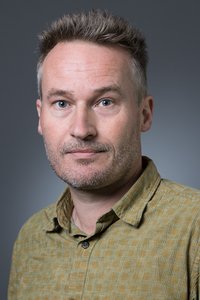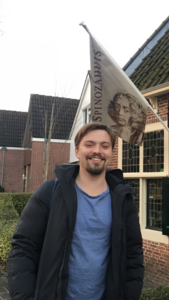Luhmann (2012, vol 1: 12) declares about his sociological theory, that it is radically anti-humanistic, radically anti-regional and radically constructivist. This short paper tries to introduce to Luhmann’s systems theoretical communication sociology and explain why and how it is anti-humanistic and, in that regard, also post-humanistic. The rationale for presenting the paper at this conference, is to contribute with the explanation of an already fully developed theory which observes itself as a posthumanistic theory. The paper does not go into the observation of non-human observers, or the earth as an observer, as promised in the first abstract.1 It’s a short paper that is just aiming at introducing to and explaining some basic traits of the theory. It refrains from introducing further potentially disturbing aspects and perspectives.
download link: https://pure.au.dk/portal/files/197159091/Paper_to_Posthumanism_2020_JT.pdf

I am associate professor in organizational communication. I hold an MA in Information Studies and Organizational Psychology from Aarhus University and a PH.D. in Media Sociography from the IT-University of Copenhagen. My primary research interests are the relations between the social and communication media. For the time being I work with how organizations cope with new media, and how digital media influence educational interaction. Theoretically I use sociological systems theory and medium theory.
I raise the debate of “Posthumanities” in relation to the concept of study, as to conceive the ongoing institutionalization of posthumanism as a practice-based experiment rather than a paradigmatic conquest.
Framing the Renaissance “studia humanitas” as a “heretical rewriting” (Wynter 1984), I argue that the humanist model of study-as-literacy anticipates the doctrines of post-anthropocentrism and critique of universal man that for example Rosi Braidotti has argued to be foundational for posthumanities (Braidotti 2018: 2019).
I rudimentarily develop the atranscendental philosophy of Bernard Stiegler’s concept-figure “idiotext” - a diagrammatic force of nested spirals - as a non-literary rewriting that can track and challenge the inchoate languages of digitality and geophysics, which is necessarily to be addressed by a posthumanist study.

Asker Bryld Staunæs is an artist and scholar. He is currently writing his thesis in philosophy on Bernard Stiegler's idiotextual spirals as a "discours aux limites du dicible". He coordinates the artistic collective Arkivaristerne°/The Institute of Emancipatory Science, is a board member at the exhibition space Spanien19C and the managing editor of the journal Foucault Studies. His research interests count posthumanism, digital humanities, archive theory and ecocriticism.
Thirty years of debates, an intrinsic tendency towards multi-discipinarity, and nuances between several addresses (aesthetic, ethic, political, literary, cultural, etc.) have made the definition of ‘posthumanism’ extremely flexible, although exposed to equivocation. We constantly run the risk to engender ambiguities, especially in the political field. In order to outline the specificity of the political posthumanism and to circumscribe it in an indirect way, my contribution aims to provide a cartography of some political positions against posthumanism(s): the liberal Conservatives, the Souverainists and the Catholics. Seen from the outside – avoiding the routine of self-promotion or constant renegotiation of what posthuman actually is – elements of originality, new lines of polemic tension, and some false oppositions reveal more negativo traces of the oncoming posthuman politics.
In the first section I will enucleate biases and implicit categories at use in the three opposing approaches, so as to identify multiple modalities of disempowering, misunderstanding, and/or attacking the posthuman condition.
In the second phase I draw some conclusions from such a vis-a-vis. Firstly, I insist on the out-dated opposition bioconservatives/technoprogressists that reached a certain popularity at the beginning of the 2000’s. Then, I clarify one of the merit of the political posthumanism: to investigate a gap between the human beings and non-human beings, that has been a blind spot of modern politics. An unspoken, break point, which is now emerging in terms of technophobic projections and ecological concerns. Categories as Person/Self; Tradition/Belonging and Creature display more and more a certain inadequacy to mediate new forms of conflictuality. I conclude, therefore, my reflections on some categories that circulate around such a gap trying to feel it, more than ‘fill it’, so as to open the political horizon to unidentifiable alterities.
Vittorio Lubrano is Ph.D. candidate in Political Philosophy at the NOVA University of Lisbon. He studied at the Alma Mater Studiorum – University of Bologna where he developed a particular interest for dialectic thought, heretical marxisms and continental political philosophy (with a strong expertise in the works of Guy Debord). Since 2018 his researches are focused on political implications of Posthuman Studies. He also cooperates with two Research Groups of Nova Institute of Philosophy (IFILNOVA) – Thinking Documentary Film (member) and Art of Living (collaborator).
One of the most unresolved notions in relation to post-/trans- and critical posthumanism is the one of agency. Rooted in universalism understanding definitions oscillate between full on one-sided human agency and claims of getting ‘beyond or after agency’. In neglecting affectivity and response/i/ability of self and other, agency remains based on a centrist worldview considered as a one-sided carte blanche for a presumed steady advance.
Self-proclaimed modes of in- or exclusion assign action exclusively to one side, whether it is human, non-human or technological. Agency thus denies or neglects reverberating effects of those which are regarded as other including the physical self. To learn response-ability is to face the messiness in which humans are effectively engaged through action and affectively hit by in manifold and each in different ways. Exclusion, ignorance, neglect, these all are deeds as well and thus part of Karen Barad's interpretation of agency as a being-doing. Decline, flourishing, as well as many in between areas are responses induced multilaterally. Crucial in revising the understanding of agency is that also human wilfulness spawns incalculable responses.
Thinking through the notion of motion as fundamental concept of matter establishes body and mind, world and self as intertwined. Such focus on interferences permits to delink the interpretation of agency as solitary act. Rather than obstructing the ability to respond in different ways the reverberating resonances of other matter that co-constitute humans as well as in/non/sub-human matter hint at the impact of possible choices. The interpretation of a lingering ‘afterimage’ that dichotomous skews the notion attempts to create a gap for reverberating interferences, sounds, voices, noises. Undefinable at first but no longer negligible inquiring for response/i/ability. The analogy suggests unlearning not as instant process but emerging almost indiscernible from a decreasing imprint.
Currently irregularly located in Berlin (Germany) and London (UK) Monika Jaeckel is a research oriented artist and writer in the fields of performance and theory. Practice-based PhD since January 2017 at the CREAM department (Centre for Research and Education in Arts and Media) of the University of Westminster, UK.